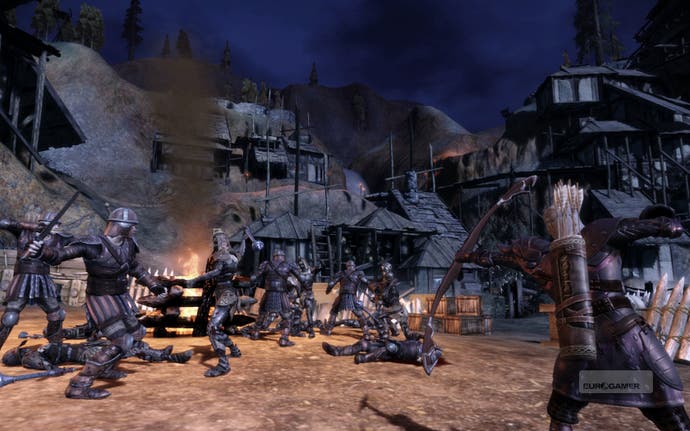Dragon Age: Origins
Wyrming out the facts from designer Mike Laidlaw.
Mike Laidlaw - Dragon Age: Origins' lead designer - stands centre-stage in front of a crowd of games journalists extolling the core values of Dragon Age. Those being violence, lust and betrayal. Which means that Dragon Age is much like Eurogamer around closing time, but that's neither here nor there.
Today BioWare is mainly dwelling on the first of the troika, letting the gathered hacks loose on an extended combat encounter against a boss (I lose, natch). Lust is teased as the major subject of E3, in a manner so lascivious I raise a gentlemanly eyebrow (some of your party are "very grateful", apparently). Which makes me think of the difficulty of taking a party-based RPG and trying to take it to a large audience. It has, after all, been a long time since BioWare wielded a broadsword +4.
It's careening towards the end, I think that's the best way to explain it. We're at the part where the PC version is pretty much locked down, and all the content is complete, and the game's fully playable. We're just doing the last bug squashes. Really, we're concentrating on the console versions to make sure they deliver the same experience as the PC. With the one notable exception of controls and interface - that's the huge hurdle.
We have experience with it, with Mass Effect moving to the PC and Knights of the Old Republic moving from Xbox to PC. Jade Empire. This is the first time we've done primarily PC development and moved it across. I think for a lot of players it's important to note that it is a PC game primarily. The lesson we've learned from doing four games like this is... well, what works for a console? What works for the PC? It's how do you make the movements of the stick work in the same way that a mouse does. We're tuning it right now. The nice thing is that when you have a game that's stable and running, you can load any save and jump into any scenario and go... can I win this fight? Is it still fun? Does this menu work? Can I equip these items easily? Can I compare them? All that kind of stuff.

I don't think so. To my mind, it's partially driven by the tactics system where you essentially have the control of the AI of your party. So if you're not controlling them, you can tell them to just behave in a certain way; say, "You're a defender! I want you to get aggro (to put it MMO terms), shield-bash people who are hitting the mages," and that kind of stuff. And those are all pre-built for one-button select. But you can tune right in, and set it so that - say - if my elf is less than this percentage health, I want you to do the following things... When we give that level of control, you can take some of the micromanagement away so you don't have to flip between them all, all the time.
To my mind, the big thing is to have the game have some pretty good feedback to give a good sense of what's actually happening. For example, if I have a warrior in plate mail I expect him to pull the hate of the enemy. We give them a series of abilities, which can build towards being better at that, make them more effective at that. The nice thing is that we're away from the concept of the magic missile, where once fired a character is completely out of things to do. It's more like mana [as in, an energy level depleted by spells]. And even after that, as a mage, you still have your staff. A rogue will probably have a bow and backstabbing. Even when you're out of true dirty tricks, there's a lot of stuff you can do.









